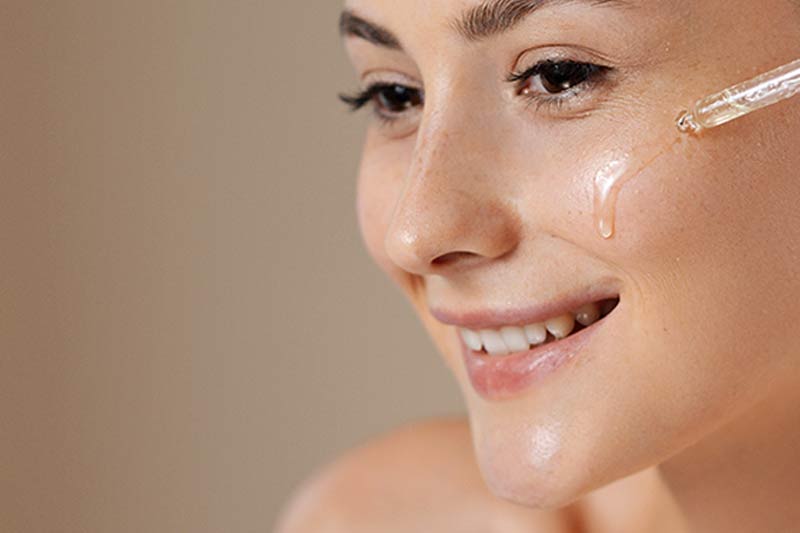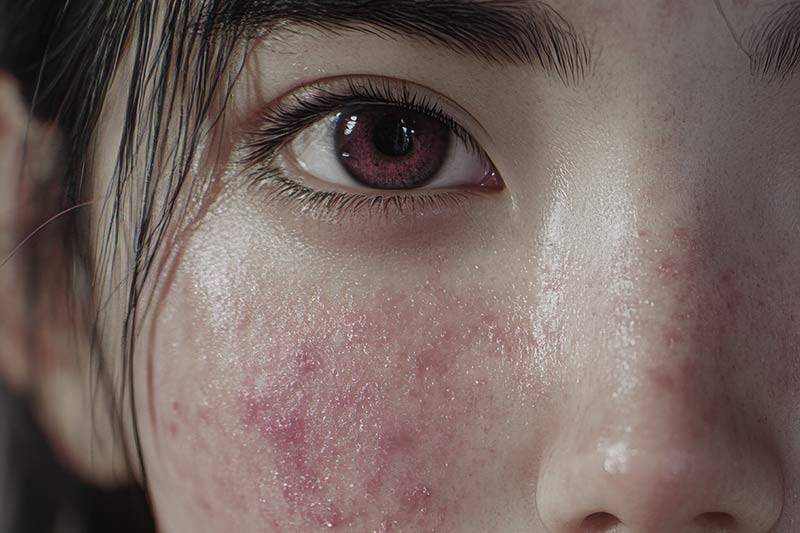Skincare products often contain fragrances that appeal to consumers but may not be good for the skin. These fragrances can be listed individually or hidden under vague terms like 'parfum,' making them difficult to identify. Some are known to trigger allergies or irritation and are best avoided by sensitive skin types.
This article covers everything you need to know about fragrance in skin care and offers gentle, fragrance-free alternatives.

Why Are Fragrances Used in Skincare Products?
Scented skincare products don’t provide direct skin-enhancing benefits and are included mainly for personal preference. Many brands use fragrance to create a signature scent, making their products more recognizable in the market.
Fragrances may be added to skincare products to:
- Mask the unpleasant smell of active ingredients.
- Evoke feel-good sensations and calm the nervous system.
- Create a sense of cleanliness and freshness.
- Emphasize certain traits of the product (e.g., “energizing” or “soothing”).
- Create a pleasant-smelling experience for customer appeal.
Which Skincare Products Contain Fragrances?
The following skincare products typically have added fragrances:
- Facial creams
- Cleansers
- Moisturizers
- Skin toners
- Serums
- Face masks
- Body lotions
- Lip balms
- Exfoliants
- Sunscreen
- Makeup
- Makeup removers
What Types of Fragrances Are Used in Skin Care?
Skincare products may contain natural or synthetic fragrances. They differ in intensity, how long they last, and their potential to aggravate the skin. The International Fragrance Association (IFRA) recognizes 3,059 fragrance ingredients, most of which are composed of:
- Alcohols
- Aldehydes
- Ketones
- Esters
- Lactones
Synthetic Fragrances
These lab-made fragrances contain long-lasting compounds that prolong the product’s freshness. They can be fully synthetic or semi-synthetic, combining artificial components with natural scent elements. Artificial fragrances can mimic certain natural scents or create entirely new ones.
Always check the expiration date – if a product stays fresh for up to five years, it likely contains synthetic fragrance ingredients.
Natural Fragrances
Natural scents are extracted from plant-based sources such as lavender, citrus fruits, vanilla, bergamot, and other botanicals. A product labeled as “all-natural” means it does not contain any synthetic components.
Natural fragrances are more volatile in long-term formulations and usually stay fresh for up to two years. Due to their shorter shelf life and sensitivity to light, heat, and air, they may be considered less practical than synthetic alternatives.
Risks and Side Effects of Fragrances in Skincare Products
According to the Campaign for Safe Cosmetics, fragrance chemicals have been linked to various health concerns, including allergies, reproductive and developmental issues, and even cancer. Some contain carcinogens, endocrine disruptors, and neurotoxic chemicals.
Both synthetic and natural fragrances can cause flare-ups and skin inflammation, especially when highly concentrated. You may also experience side effects like light-headedness or headaches if you are sensitive to strong scents.
The most common fragrance-induced risks include the following:
- Redness
- Swelling
- Allergies
- Contact dermatitis
- Acne
- Breakouts
- Itchiness
- Dizziness
- Migraines
- Asthma
Note: A fragrance-free label doesn’t automatically mean the product is ideal or microbiome-friendly. Watch out for other potential skin irritants like paraben, silicone, phthalates, alcohol, and SLS, and choose products with barrier-supporting ingredients.
How to Identify Fragrances in Skincare Products?
Fragrances are not always easy to spot. They may be included under generic terms like these:
- Fragrance
- Odor
- Parfum
- Perfume
- Aroma
- Essential oil blend
- Flavor
They may also be listed individually as one of the following:
- Acetaldehyde
- Benzyl alcohol
- Benzyl benzoate
- Citral
- Citronellol
- Cinnamal
- Geraniol
- 3-cyclohexene carboxaldehyde
- Linalool
- Limonene
- Vanillin
- Eugenol
- Tetrahydrolinalool
Regulations for Fragrances in Cosmetics
A product that lists “fragrance” may include individual ingredients in parentheses, but that isn’t always the case. Disclosure depends on the company’s marketing strategy (some brands voluntarily choose to list all ingredients) and the regulatory standards of the region (the EU has stricter labeling requirements than the U.S.).
According to the FDA, all ingredients must be listed individually to ensure full transparency. However, U.S. regulations allow fragrance and flavor components to be classified as trade secrets, which means they can legally remain undisclosed. Furthermore, fragrance-containing products do not undergo premarket approval. However, manufacturers are legally obligated to ensure product safety. Consumer Product Safety Commission (CPSC) can issue recalls or ban products with skin-sensitizing ingredients.
In contrast, the EU’s Scientific Committee on Consumer Safety (SCCS) requires full disclosure of 26 fragrance allergens and additional fragrance ingredients.
Is “Unscented” the Same as “Fragrance-Free”?
It is important to know that unscented is different from fragrance-free. An unscented skincare product means it does not have a scent, but fragrance chemicals may still be present.
Fragrance Allergens in Skincare Products
The scientific bodies of the European Union have identified twenty-six fragrance allergens in skincare products with the potential to irritate the skin, increase sensitivity, and worsen certain skin conditions. Interestingly, most of them are derived from plants and essential oils.
Watch out for these twenty-six fragrance allergens:
- Alpha-isomethyl Ionone
- Amyl Cinnamal
- Amyl Cinnamyl Alcohol
- Anise Alcohol
- Benzyl Alcohol
- Benzyl Benzoate
- Benzyl Cinnamate
- Benzyl Salicylate
- Butylphenyl Methylpropional
- Cinnamal
- Cinnamyl Alcohol
- Citral
- Citronellol
- Coumarin
- Eugenol
- Evernia Prunastri Extract
- Evernia Furfuracea Extract
- Farnesol
- Geraniol
- Hexyl Cinnamal
- Hydroxycitronellal
- Hydroxyisohexyl 3-cyclohexene Carboxaldehyde (HICC)*
- Isoeugenol
- Limonene
- Linalool
- Methyl 2-octynoate
How to Identify a Fragrance Allergy?

Fragrances are a leading cause of contact allergy, especially among individuals with contact dermatitis. Sensitivity to allergens can develop over time or with repeated exposure.
When the body is sensitized to fragrance molecules, it releases histamine and other inflammatory agents in response to a perceived threat, causing the following reactions:
- Rashes
- Swelling
- Itching
- Flaking
- Redness
- Irritation
- Excessive dryness
If you notice any allergic reactions in contact with fragranced products, consult an allergist to help identify the exact fragrance ingredient causing the reaction. The doctor will perform an allergy test to determine your sensitivity to specific fragrance ingredients.
Who Should Avoid Fragrance in Skin Care?
Exclude all forms of fragrances in skin care if you have:
- Confirmed or suspected allergies to natural or artificial scents, aromas, and additives.
- An inflammatory skin condition like rosacea, psoriasis, or eczema.
- Increased sensitivity to skincare ingredients or frequent breakouts and flare-ups.
- A hyperpigmentation disorder like melasma, dark spots, or age spots.
- Damaged skin, open wounds, sores, micro-injuries, and active acne.
- Headaches or recurring migraines due to hypersensitivity to odors.
Pregnant women and infants should avoid using fragranced skincare products to prevent potential health hazards.
How to Safely Use Skincare Products with Fragrances
Skin experts recommend using fragrance-free skincare products whenever possible. However, if you want to keep using your favorite fragranced products safely, follow these guidelines:
- Carefully read the ingredient label for potential skin irritants and allergens.
- Purchase brands that promote full ingredient transparency.
- Choose minimalist formulas with fewer artificial ingredients and additives.
- Use patch testing inside of your forearm and wait for at least 24 hours to see if there are any reactions.
- Avoid using fragranced products on more sensitive skin areas, such as the eye area, face, and neck.
A good rule of thumb is to avoid fragranced leave-on products, such as moisturizers, if you have sensitive or allergy-prone skin. Rinse-off products like shower gels or cleansers are less likely to cause irritation or allergic reactions because they are quickly washed off.
Fragrance-Free Skin Care
Choose fragrance-free formulations to prevent potential irritation, preserve a healthy microbiome and skin barrier. Reducing the number of potentially toxic chemicals will also limit the chances of developing an allergy.
Vibrant skin experts recommend soothing, microbiome-supporting formulas that strengthen the barrier, prevent moisture loss, and restore healthy skin flora. These products are suitable for all skin types and are free from common irritants.
Conclusion
Choosing a fragrance-free skincare product is a matter of personal choice. Some prefer to use clean products with minimal additives to reduce exposure to harmful chemicals, while others continue to apply fragranced products daily. However, understanding the different types of fragrances and their potential effects on the skin can help you make a more informed choice.
To stay safe, consult our team of skin professionals who can guide you toward products that match your skin’s needs and sensitivity.


